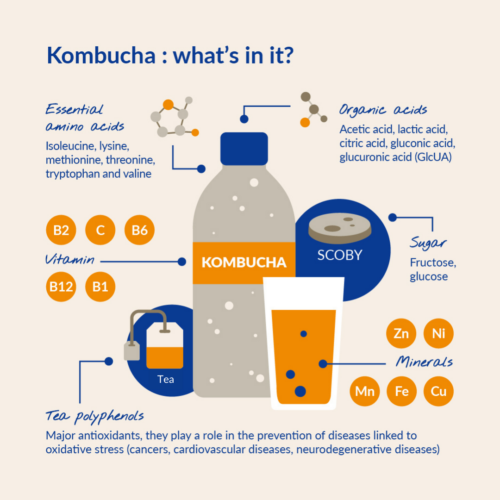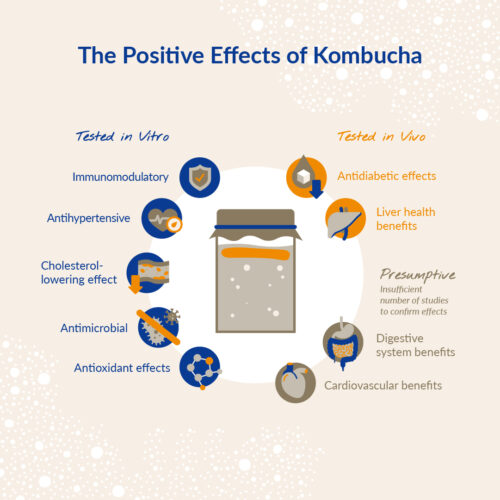What is Kombucha?
Kombucha is a fermented beverage with a slightly sweet and acidic taste, carbonated and potentially mildly alcoholic. It is obtained by fermenting sweetened tea with a symbiotic culture of bacteria and yeast, known as SCOBY, an acronym for Symbiotic Colony Of Bacteria and Yeast.
How is kombucha prepared?
Black or green teas derived from Camellia sinensis L. leaves and sucrose are traditionally used for the preparation and fermentation of kombucha. The SCOBY, sometimes referred to as the “mother of kombucha,” contains several species of bacteria such as acetic bacteria, lactic acid bacteria, and various yeast species.
During fermentation, yeast hydrolyzes sucrose into glucose and fructose, which are then converted into alcohol, along with simultaneous production of carbon dioxide. Acetic bacteria subsequently convert ethanol and glucose into respectively acetic acid and gluconic acid, while lactic acid bacteria use glucose and fructose molecules to produce lactic acid.
This fermentation process generates numerous compounds of interest which are said to have health benefits for humans.
Where does this fermented beverage come from?
Referred to as the “elixir of immortality,” kombucha originates from China and was reportedly first used in Asia around 220 B.C. for its therapeutic properties. This ancient beverage spread to Japan around 414 A.D. when a physician named Komu-ha or Kombu used it to treat the digestive issues of Emperor Ingyō. The use of kombucha then expanded to Russia, Eastern Europe in the 1800s, and further to Western Europe and North Africa during World War II.
Why is Kombucha a current trend?
The global kombucha market was valued at 3.4 billion dollars in 2023 and is expected to grow at an average annual rate of 17.4% over the period 2023-2033.
The current craze for kombucha is partly due to the virtues attributed to it. Indeed, this fermented beverage offers numerous advantages that appeal to increasingly health-conscious consumers looking to adopt a healthier and more sustainable diet.
Kombucha is renowned for being a “healthy” functional beverage with potential positive effects on health. Manufacturers highlight its sugar content, which is five times lower than that of soda, its low alcohol content (0.5%), and its taste. Alongside traditional kombucha, they compete by introducing a range of kombucha beverages with innovative flavors, including fruit, herbal plant, or vegetable flavors.
Moreover, the wide and varied distribution channels, such as health food stores, supermarkets, and online sales, make these products easily accessible to a large number of people.
Finally, the possibility of crafting kombucha artisanally at home is highly appealing to many consumers, facilitated by the dissemination of numerous recipes available online.
Is Kombucha a healthy drink?
But beyond marketing claims, what does science say?
Studying the microbiological and chemical composition of kombucha highlights potential health benefits. However, it’s essential to note that the presence of certain components in the beverage and their actual quantity depends on numerous factors:
- the SCOBY used for kombucha fermentation ;
- fermentation time and temperature ;
- sucrose content ;
- type of tea used.
Not to mention that this also depends on the analytical methods used for quantification purposes.
Microbiological compounds (bacteria and yeasts) found in kombucha
That being said, according to Laura M. Nyhan and Kieran M. Lynch, the microorganisms present in kombucha are diverse. Among the main ones, we can find:
- yeasts of different species: Zygosaccharomyces, Saccharomyces, Brettanomyces ;
- acetic acid bacteria of the Komagataeibacter, Acetobacter, Gluconobacter type ;
- lactic acid bacteria of the Lactobacillus, Bifidobacterium type.
The presence of this richness in “probiotic” microorganisms (yeasts and bacteria) could potentially lead to beneficial effects on health, such as improving digestive and mental well-being or strengthening the immune system.
The beneficial chemical compounds found in kombucha
Moreover, according to Jessica Martínez Leal et al., in an article published in CyTA – Journal of Food in 2018, the fermentation process responsible for the beverage also generates a wide variety of chemically interesting compounds. Their presence and quantity have been highlighted through chemical dosages of kombucha.
Thus, traditional kombucha is mainly composed of:
- vitamins: vitamin C, a potent antioxidant, and B-group vitamins such as B1, B2, B6, B12 ;
- minerals such as copper, iron, manganese, nickel, and zinc, whose presence is necessary to ensure normal body functions and growth, as well as tissue maintenance ;
- essential amino acids: Isoleucine, lysine, methionine, threonine, tryptophan, and valine ;
- sugars: fructose, glucose ;
- organic acids such as acetic acid, lactic acid, citric acid, gluconic acid, glucuronic acid (GlcUA) ;
- tea polyphenols, major antioxidants that play a role in preventing diseases related to oxidative stress like cancer, cardiovascular diseases, and neurodegenerative diseases.
The benefits of kombucha can be attributed to the synergistic action of these various compounds, making the beverage potentially beneficial for health.

What biological activities are described in scientific literature on Kombucha and the clinical evidence?
The increasing consumption of kombucha worldwide has prompted the development of scientific studies focusing on analyzing the biological activities of the fermented beverage.
Hepatoprotective effects of kombucha in rats were demonstrated through a research conducted by Karibi et al. (2013).
Zubaidah et al. (2018) tested the antidiabetic effect of kombucha and observed a reduction of 31 to 59% in fasting plasma glucose levels in diabetic rats orally administered kombucha for 28 days.
However, health benefits attributed to kombucha for human consumption are predominantly studied in vitro. Additional in vivo research is necessary to assess the compounds’ bioavailability and bioaccessibility, as well as clinical trials to provide clinical evidence and enhance the understanding of the benefits and risks associated with drinking kombucha. Indeed, the number of clinical trials conducted to evaluate and confirm the positive effects of kombucha on human health is significantly low. A systematic review of scientific literature identified only three registered clinical trials since 2018.

Kombucha in the future
As the kombucha market is expanding, are there solutions to ensure a secure process and a consistent final product over time? Will it be possible in the future to make health claims about kombucha? Research continues, and stakeholders in the world of kombucha seem convinced this ancient product has a future.
Since 2014, the Kombucha Brewers Institution (KBI), a non-profit trade association of commercial kombucha brewers worldwide, has been working to make the industry evolve through research, communication, and legislation. As of December 2021, 215 commercial kombucha companies worldwide were registered within the KBI (69.8% in North America and 16.3% in Europe).
At Lesaffre, we are engaged in innovative research in the field of fermentation and microbial consortia. Researchers from the Lesaffre Institute of Science & Technology (LIST) collaborate closely with Fermentis, a business unit specializing in fermented beverages. The objective is to unlock the potential of microorganisms involved in kombucha and develop safe processes that ensure the full expression of flavors and benefits of this remarkable fermented beverage.


